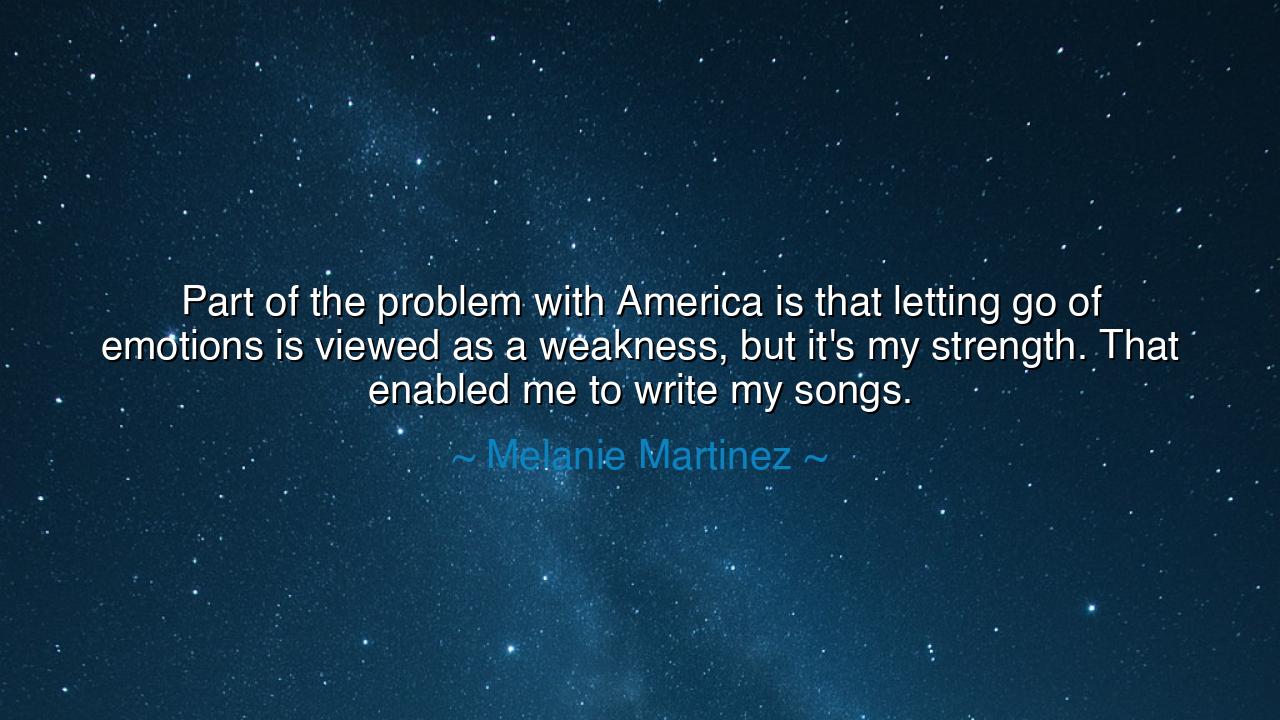
Part of the problem with America is that letting go of emotions
Part of the problem with America is that letting go of emotions is viewed as a weakness, but it's my strength. That enabled me to write my songs.






Hear the words of the songstress and poet, Melanie Martinez, who spoke with courage against the false teachings of her age: “Part of the problem with America is that letting go of emotions is viewed as a weakness, but it's my strength. That enabled me to write my songs.” In these words is a defiance of shallow values, for she declares that the act many call frailty—expressing emotions—is in truth a fountain of power. Her voice reminds us that the heart unburdened is not broken, but free, and from that freedom flows creation, healing, and truth.
The meaning is this: societies often glorify hardness, teaching their children to conceal their tears, to mask their pain, to wear strength like armor. Yet the armor, if worn too long, becomes a prison. To let go of emotions is not to collapse, but to release the poison of silence. It is to choose honesty over pretense, openness over repression. Martinez shows us that what the world scorns as weakness is the very source of her art, her voice, and her power. Her strength is born not from hiding her heart, but from unveiling it.
The ancients themselves knew this wisdom. Consider the psalms of King David, who wept, sang, lamented, and rejoiced before his people and his God. His openness did not make him weak; it made him a poet whose words endured through centuries. His willingness to let emotion flow became the strength that lifted a people, gave voice to their grief, and inspired their hope. So too does Martinez remind us that to give shape to one’s inner world is to wield a power that silence cannot contain.
History also bears witness. Think of Abraham Lincoln, who battled deep melancholy throughout his life. He did not deny his sorrow but let it guide his speeches and decisions, speaking with compassion for both North and South during the Civil War. His words—born of grief and empathy—moved a divided nation toward healing. If he had hidden his emotions as weakness, his voice would not have carried the same weight of truth. His strength came from allowing his emotions to guide him, not from burying them.
Martinez also points us to the power of creation that arises from vulnerability. Her songs were not born from detachment but from feeling deeply, from transforming pain and joy into melodies that touched countless souls. This is the paradox of life: what we fear will break us often becomes the very thing that makes us strong. Tears, when released, water the seeds of art and understanding. Silence, when shattered, becomes the music that heals others.
The lesson for us is luminous: do not be deceived by the false teaching that emotions are weakness. To feel is to be human; to express is to be free; to transform emotion into words, deeds, or art is to wield the greatest strength of all—the power to connect with others in truth. The stone-hearted may seem unbreakable, but they cannot inspire. It is the open-hearted who move the world.
Practical actions must follow. When you feel sorrow, do not bury it; write it, sing it, speak it, share it. When you feel joy, let it flow and strengthen those around you. Encourage children to express, not repress, for in their openness lies their future strength. And in your own journey, use emotion as fuel, not as chains—let it guide your growth, your relationships, and your creativity.
For remember this eternal truth: letting go of emotions is not weakness—it is strength. The heart that dares to express is the heart that dares to live. As Martinez teaches, it is this courage to release what lies within that enables creation, builds compassion, and awakens the power that slumbers in every soul. Let your emotions flow, and in their current, you will discover your deepest strength.






AAdministratorAdministrator
Welcome, honored guests. Please leave a comment, we will respond soon